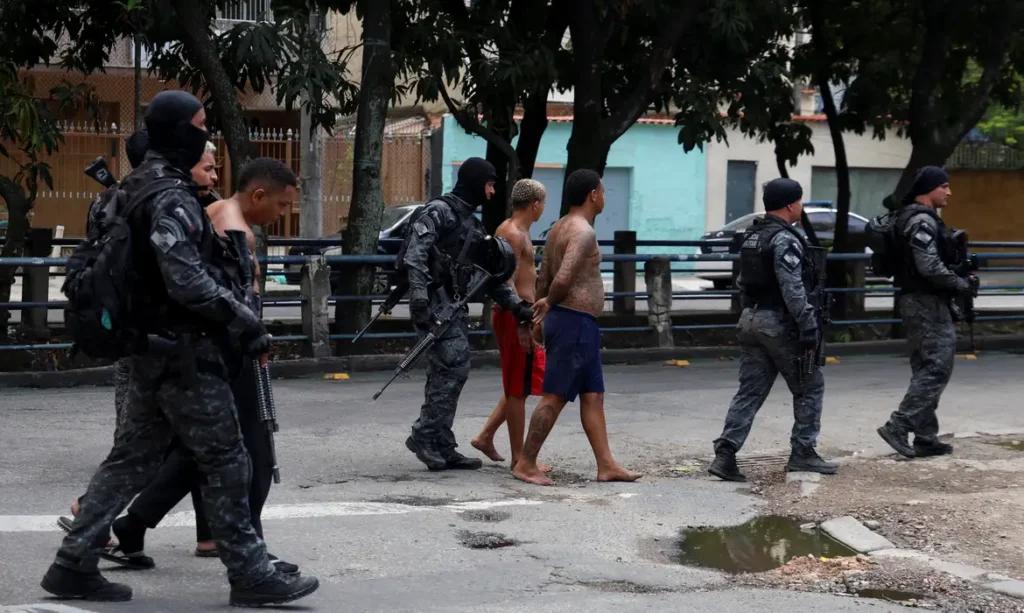
Agência Brasil - EBC
It wasn’t exactly a surprise. The Atlas Intel poll, conducted between October 29 and 30, 2025, helps explain why there was such a violent operation in the Complexo do Alemão, in Rio de Janeiro. The survey was carried out on two levels: a national sample with 1,089 respondents and another specific to the City of Rio de Janeiro with 1,527 interviewees. The results reveal important differences between the national perception and that of the capital fluminense.
The data indicates there was political interest, as some sectors know that violence is popular. And since the right-wing does not want to deliver education, health, or urban mobility, it is much more comfortable for them to deliver corpses. It wins votes without needing to redistribute wealth.
There is another enormous advantage for the right in following this strategy: pushing the left into the uncomfortable position of defending institutional order when the majority seems to want barbarism.
On the other hand, the numbers are not all bad. At the national level, 55.2% of Brazilians supported the operation, but an expressive percentage of 42.3% did not. This shows that the country has matured and that an important slice of the population is concerned about a fight against crime that preserves the safety of the police officers themselves and of civilians.
Furthermore, 42% of those interviewed in the country consider that the action was motivated by political gain, against 39.3% who see it as the best way to combat crime.
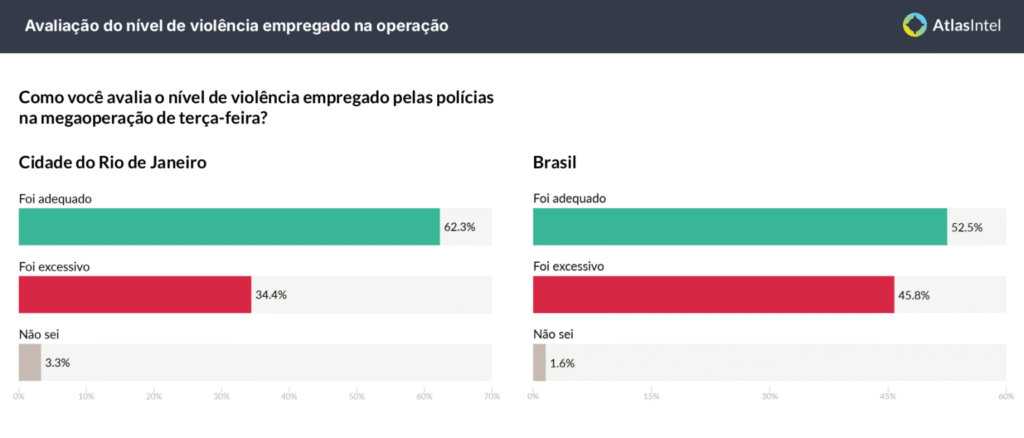

The poll reveals a striking division of worldviews. Among Lula’s voters in Brazil, there was a very critical perception of the operation, especially due to the number of deaths. Among Bolsonaro’s voters, however, it was approved almost unanimously: 99.1% approval among Bolsonaristas, compared to only 12.1% among Lulistas.
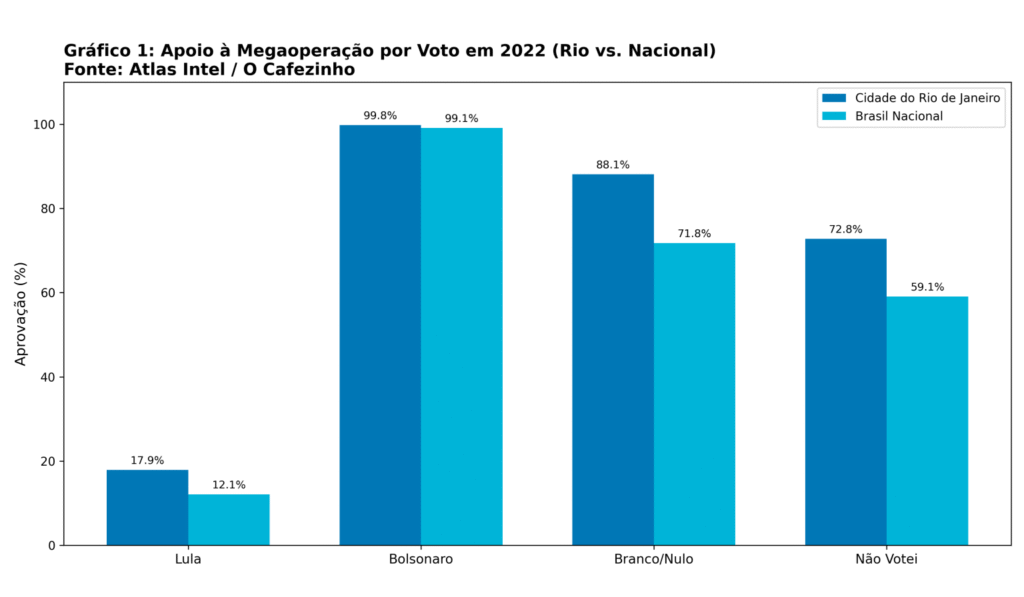
What is truly worrying is the scenario in Rio de Janeiro. In the capital fluminense, 62.2% supported the operation, compared to 55.2% in Brazil. And what caught attention was the strong support in the favelas cariocas: 87.6% of residents approved of the action. But this shouldn’t be surprising. Those who live in these communities are the ones who suffer most from tráfico, the milícia, and the war between factions and with the police. It is natural that they desire an action that solves the problem of criminality.
It is up to the Republic’s institutions to offer protection without putting citizens’ lives at risk, without collapsing the city, and without killing innocents. From a political standpoint, the numbers show an opportunity for the progressive camp: there is a social sector—larger than on other occasions—that is viewing this type of operation critically.
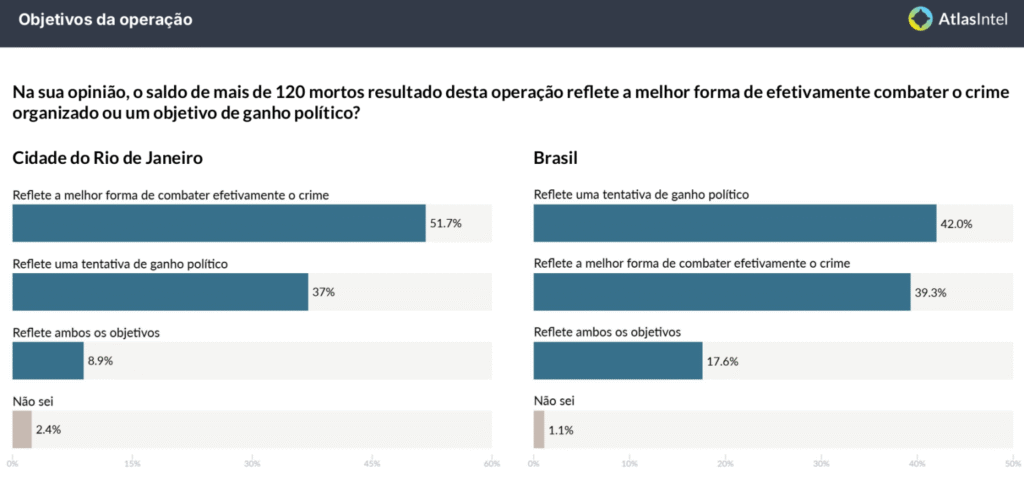
The right-wing, naturally, waves the data as proof that “the people want slaughter.” It’s not quite like that. Information about the possible excesses and the real intention of the operation has not yet circulated widely.
The survey warns the left about the “casca de banana” (banana peel) that the right is throwing. It is necessary to incorporate the popular demand for protection and understand the revolt against the factions. The fight against crime is a fundamental democratic cause, as crime limits not only the freedom to come and go, but the most fundamental of all, the freedom to be alive.
The left needs to adopt tough language in this fight, defending visible policing and strong repression against armed organizations.
At the same time, it is necessary to show that the right manipulates the debate and that the long-term answer involves social policies, such as jobs for the youth. The discourse cannot be mixed: one to fight crime, another to offer opportunities.
In this context, the gesture of Minister Guilherme Boulos, who asked for a minute of silence for the victims, was seen as inappropriate by 59.8% of those interviewed in Rio de Janeiro. The poll indicates that the population of the communities wants policing and protection, not a minute of silence. It was a mistake, albeit well-intentioned.
The episode shows that the Lula government needs intelligence and initiative. It is time to adjust the budget, create a Ministry of Public Security, and make a great national effort. It is not enough to offer statistics on the drop in homicides; what is needed is visibility, assertive communication, and a demonstration of moral firmness against crime.
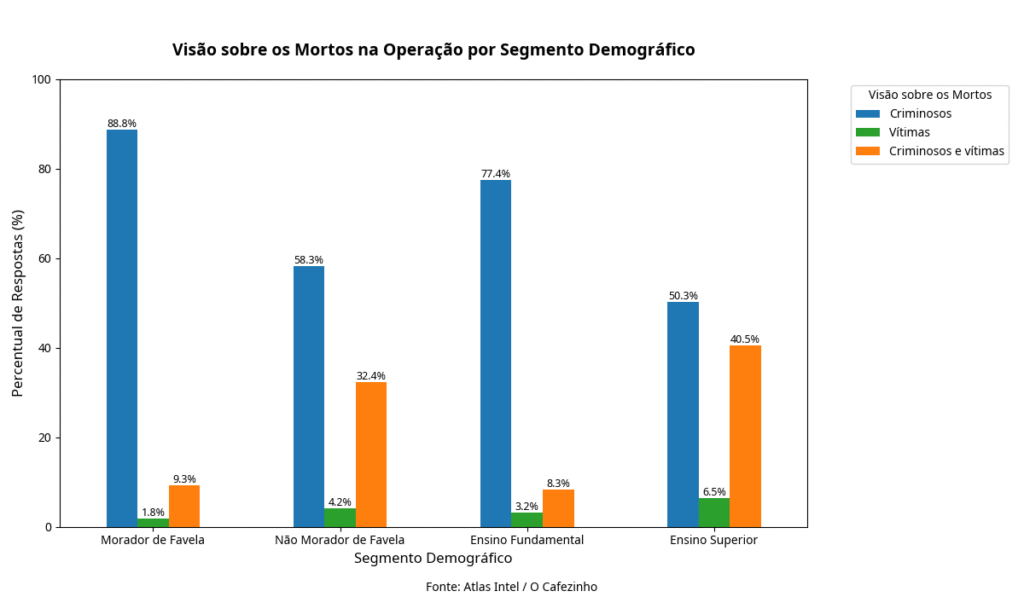
The full Atlas Intel reports can be downloaded here (national), here (city of Rio), and here (city vs. country comparison).
Notes for Readers:
- Atlas Intel: A prominent Brazilian polling and data intelligence firm.
- Complexo do Alemão: A large and well-known complex of favelas (working-class neighborhoods) in Rio de Janeiro, often the site of conflicts.
- Capital Fluminense: A formal term for the city of Rio de Janeiro. (Residents of the state of Rio de Janeiro are fluminenses; residents of the city are cariocas).
- Lula / Lulistas: President Luiz Inácio Lula da Silva / his supporters.
- Bolsonaro / Bolsonaristas: Former far-right president Jair Bolsonaro / his supporters.
- Favelas Cariocas: The favelas located in the city of Rio de Janeiro.
- Tráfico: Literally “trafficking,” this term is used universally in Brazil to refer to heavily armed drug factions that control territories.
- Milícia (Militia): Paramilitary groups, often formed by off-duty or former police officers and firefighters, that exercise illegal territorial control over favelas, extorting residents and businesses. They are a major power in Rio, distinct from the tráfico.
- Progressive Camp (Campo Progressista): A general term for the Brazilian left and center-left political sphere.
- “Casca de banana” (Banana peel): A common Brazilian idiom for a trap or a simple mistake that can cause a big fall.
- Guilherme Boulos: A prominent federal minister in Lula’s government and a leader of the Homeless Workers’ Movement (MTST), representing the further-left wing of the government coalition.
- Ministry of Public Security: The author is advocating for the (re)creation of a dedicated federal ministry for public security, separate from the Ministry of Justice, to give the issue higher priority and political visibility.








